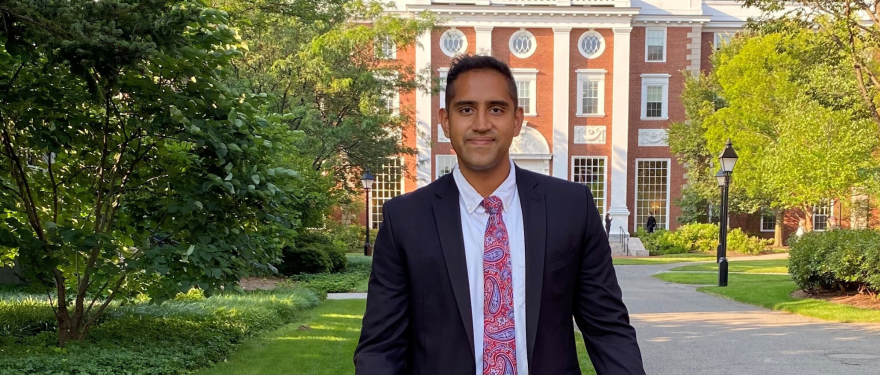Ashutosh (Ash) Panchang (MS/MBA 2023) grew up in India and Virginia. He received his B.S. from the University of Virginia in Systems Engineering. Today he is a joint degree student pursuing the Harvard MS/MBA: Engineering Sciences joint degree. Prior to attending HBS, Ash worked in financial planning and operations roles at Blue Apron, Peloton, and Burrow. Ash is also an investment partner at The MBA Fund, an early-stage fund that backs student and alumni founders from Harvard, Stanford, and the University of Pennsylvania.
I have found during my first year at Harvard Business School that there are an infinite number of ways to spend your time learning – each equally compelling but vastly unique and tailored to various learning styles. One of the most powerful ways of learning is through reflection, including through reflections of others. This is why, as a fan of all things entrepreneurship, I took time over the previous semester to speak with and learn from the numerous Entrepreneurs-in-Residence (EiRs) at the HBS Rock Center. The EiRs are experienced founders and mentors who offer their time to coach students interested in different dimensions of entrepreneurship. Collectively their expertise ranges from operating to fundraising to investing across a spectrum of industries and business models.
Over the course of the semester I had a chance to speak with Matt Salzberg (HBS 2010), founder of Blue Apron; Katia Beauchamp (HBS 2010), founder of BirchBox; Stacey Boyd (HBS 1997), founder of Olivela; Avni Patel Thompson (HBS 2008), founder of Milo; and Lisa Skeete Tatum (HBS 1998), founder of Landit.
I was not only surprised by the ease of setting up an appointment to have a conversation with them but also grateful in the way that each entrepreneur approached these appointments. I began with a simple question, which was to ask them about their entrepreneurial journey and what they have learned through their successes and failures. The conversations were incredible and provided a lens into the uncertainties, insecurities, and revelations that come with the (sometimes glorified) life of an entrepreneur. Here are three of my favorite lessons from these conversations:
When speaking with Katia Beauchamp, I learned about the importance of value systems within teams. She explained how vital it is for founders to establish and build upon a set of values for the immediate leadership team and broader organization. At Birchbox Katia has adopted the concept of conscious leadership which she defined as: always being forthcoming with your feelings about a situation before diving into the details. In practice, members are encouraged to start a meeting with their initial position, which can be either “above the line” or “below the line.” To be above the line means that you are open and excited about the topic at hand; to be below the line is to be apprehensive or to interpret a situation as having control over your team. Katia explained that leaders cannot always reside above the line, and it is unfair to expect that of yourself or your teammates. However, what is invaluable is to be self-aware and share what it is that pulls you below the line. Founders who can create an open space for their leadership team and promote this style of expression are best positioned to tackle the challenges that come with building a company.
During my conversation with Stacey Boyd I learned about the importance of storytelling. Olivela is a luxury brand that embodies philanthropy through every transaction –20% of the proceeds from every purchase are donated. She explained that the novel business model has remained consistent since the company’s inception and has thrived in part because of the partnerships she has developed. To build these partnerships and communicate her idea, Stacey mastered the art of storytelling. Stories help illustrate how compelling a problem is by going beyond quantitative measures to incorporate an emotional dimension.
When I spoke with Matt Salzberg he explained the importance of seeking and interpreting feedback. Matt said that Blue Apron was born out of the thesis that every major consumer category at the time would be penetrated by e-commerce. The grocery and packaged food spaces were untouched and opportune for e-commerce applications.
He shared that exploring a space and carving out an idea requires you to seek out feedback from various perspectives. Acquiring honest feedback is fraught with challenges which can be overcome by being thoughtful with who you ask and how you ask them. Your network may be inclined to immediately encourage you and reaffirm your assumptions. However, that is not what you always need; you want to be able to rigorously test your idea each step of the way. Therefore, try to seek input from individuals outside of your immediate network and reach out to subject matter experts and investors to identify what set of conditions could strengthen your idea or undermine your vision.
The conversation with Matt was additionally special as Blue Apron was my launchpad into the world of start-ups. It was the first time I came to appreciate the emotional toll of building a product and the deep joy that comes from finding customers who love it. I recalled fondly that while working at Blue Apron I had the chance to speak with Matt and learned of how HBS played a part in his career journey. My experience working at start-ups (two of them by HBS graduates: Blue Apron and Peloton) motivated me to apply to the HBS MBA. I was also excited to apply because of the recently launched MS/MBA: Engineering Sciences joint degree program, which combines the full-time MBA with a deep and fundamental curriculum in multiple engineering disciplines, product design, and venture creation (all of which are becoming increasingly important to become a successful investor or operator across industries!).
Learn more about the MS/MBA: Engineering Sciences joint degree here.

